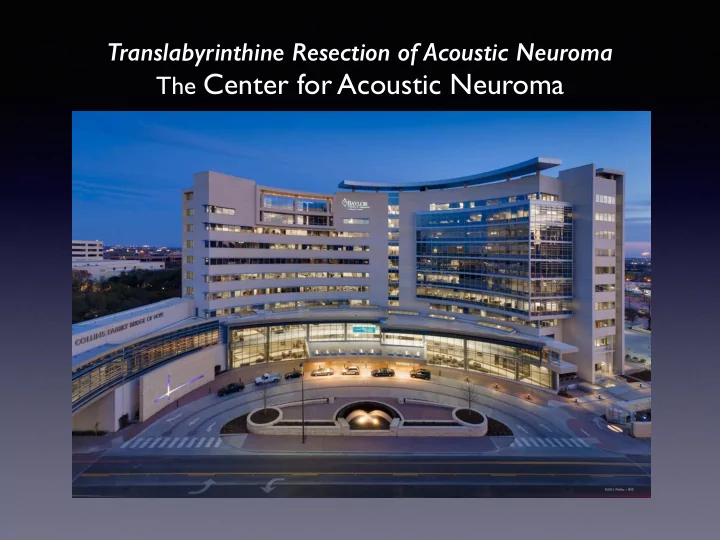

Translabyrinthine Resection of Acoustic Neuroma The Center for Acoustic Neuroma
Translabyrinthine Resection of Acoustic Neuroma Indications 1 - Any tumors with non-serviceable hearing Servicable hearing 50/50 rule Speech discrimination >50% Pure-tone average threshold >50% 2 -Tumors larger than 3 cm in the CPA 3 - Tumor in the CPA extending to lateral ICA
Translabyrinthine Resection of Acoustic Neuroma Middle Fossa Approach Tumors confined to the IAC with serviceable hearing Retro-sigmoid approach Tumors less than 3 cm with serviceable hearing and minimal IAC invasion
Translabyrinthine Resection of Acoustic Neuroma Patient Counseling Personal Tips 1 - Focus on attainable goals 2 - Facial nerve preservation is the first priority 3 - I never saw an unhappy patient with good facial outcome and unilateral hearing loss 4 - I never saw a happy patient with a facial paralysis
Translabyrinthine Resection of Acoustic Neuroma ADVANTAGES 1 - DIRECT EXTRADURAL ROUTE TO CEREBELLO-PONTINE ANGLE 2 - NO CEREBELLAR RETRACTION OR MANIPULATION 3 - CONSISTENT ACCESS TO THE FUNDUS OF THE IAC 4 - EARLY IDENTIFICATION OF THE FACIAL NERVE AT FUNDUS OF THE IAC 5 - NO MANIPULATION OF THE LOWER CRANIAL NERVES 6 - NO POSTOP CHRONIC HEADACHE TL RS
Translabyrinthine Resection of Acoustic Neuroma DISADVANTAGES 1 - HEARING LOSS
Translabyrinthine Resection of Acoustic Neuroma EXPANDING TRANSLABYRINTHINE LIMITS HUGO FISH - TRANSOTIC APPROACH MARIO SANNA - IAC DURAL MOBILIZATION 4.5 cm
Translabyrinthine Resection of Acoustic Neuroma EXPANDING TRANSLABYRINTHINE LIMITS Center for Acoustic Neuroma - CombinedTranslabyrinthine/Middle Fossa
Translabyrinthine Resection of Acoustic Neuroma EXPANDED TRANSLABYRINTHINE APPROACH RATIONALITY 1 -TO FACILITATE ACCESS AND CONTROL OF ALL CIRCUMFERENCE TO LARGE ACOUSTIC NEUROMA VIA TRANSLAB APPROACH 2 -TO IMPROVE CONTROL /VISUALIZATION OF THE FACIAL NERVE AT THE CPA 3 - TO ALLOW 270 DEGREE EXPOSURE OF THE IAC
Translabyrinthine Resection of Acoustic Neuroma EXPANDED TRANSLABYRINTHINE APPROACH RATIONALITY (cont.) 4 - TO ALLOW EXTRADURAL VISUALIZATION OF THE PORUS OF MECKEL’S CAVE 5 - TO ALLOW EARLY VISUALIZATION AND CONTROL OF THE TRIGEMINAL NERVE IN THE CPA 6 - TO ALLOW VISUALIZATION OF THE CN IX AT THE COCHLEAR AQUEDUCT 7 - TO ALLOW EASY CONTROL OF LOWER CRANIAL NERVES
Translabyrinthine Resection of Acoustic Neuroma Expanded Translabyrinthine Approach Skin incision Expanded TL TL
Translabyrinthine Resection of Acoustic Neuroma Expanded Translabyrinthine Approach Skin flap
Translabyrinthine Resection of Acoustic Neuroma Expanded Translabyrinthine Approach Muscle mobilization
Translabyrinthine Resection of Acoustic Neuroma Expanded Translabyrinthine Approach Decortication Removal of temporal squamosa
Translabyrinthine Resection of Acoustic Neuroma Expanded Translabyrinthine Approach Opening the antrum Visualization lateral semicircular canal
Translabyrinthine Resection of Acoustic Neuroma Expanded Translabyrinthine Approach Visualization of the Epitympanum Removal of retro-facial air cell
Translabyrinthine Resection of Acoustic Neuroma Expanded Translabyrinthine Approach Visualization the superior semicircular canal Removal of the retro-labyrinthine air cell and cortex Visualization of the digastric ridge, endolymphatic sac and pre-sigmoid dura
Translabyrinthine Resection of Acoustic Neuroma Expanded Translabyrinthine Approach Elevation of the middle fossa dura Section of middle meningeal artery
Translabyrinthine Resection of Acoustic Neuroma Expanded Translabyrinthine Approach Elevation of the middle fossa dura Visualization of V3
Translabyrinthine Resection of Acoustic Neuroma Expanded Translabyrinthine Approach Elevation of the middle fossa dura Visualization of the arcuate eminence and anterior petrous bone Visualization of gasserian ganglion
Translabyrinthine Resection of Acoustic Neuroma Expanded Translabyrinthine Approach Further visualization of the middle fossa anatomy
Translabyrinthine Resection of Acoustic Neuroma Expanded Translabyrinthine Approach Splitting of the layers of the tentorium
Translabyrinthine Resection of Acoustic Neuroma Expanded Translabyrinthine Approach Labyrinthectomy
Translabyrinthine Resection of Acoustic Neuroma Expanded Translabyrinthine Approach Exposure of the vestibule and internal auditory canal
Translabyrinthine Resection of Acoustic Neuroma Expanded Translabyrinthine Approach Removal of bone anterior and around the IAC
Translabyrinthine Resection of Acoustic Neuroma Expanded Translabyrinthine Approach The anatomy of the fundus of the IAC
Translabyrinthine Resection of Acoustic Neuroma Expanded Translabyrinthine Approach Dural opening
Translabyrinthine Resection of Acoustic Neuroma Expanded Translabyrinthine Approach View of the CPA
Translabyrinthine Resection of Acoustic Neuroma Expanded Translabyrinthine Approach Tumor view TL Expanded TL
Translabyrinthine Resection of Acoustic Neuroma Expanded Translabyrinthine Approach Closure
Translabyrinthine Resection of Acoustic Neuroma Expanded Translabyrinthine Approach Closure
Translabyrinthine Resection of Acoustic Neuroma Patient EB 21 yo male severe left hearing loss Occipital headache Balance difficulties (MRI pre op)
Translabyrinthine Resection of Acoustic Neuroma Patient EB Surgery -Expanded Translab with tentorial split Facial nerve - inferior course
Translabyrinthine Resection of Acoustic Neuroma Patient EB Discharged to home in three days Facial nerve - I/VI patient has finished college and is fully employed MRI 3 years post op - no residual no T2 or Flair abnormal signal
Translabyrinthine Resection of Acoustic Neuroma Patient CD 22 yo Incidental finding Near normal hearing Retro-auricular pain Tinnitus No balance difficulty
Translabyrinthine Resection of Acoustic Neuroma Patient CD Surgery - Expanded translab with tentorial splitting Blood loss100cc No transfusion Facial nerve - superior course Minimal splaying Adequate plane Resection - near complete Thin layer left over the nerve Facial nerve - Early 3/6 3 months - 2/6 Living independently at 3 months
Translabyrinthine Resection of Acoustic Neuroma Patient KH 17 yo Difficulties using the left leg during tennis practice Hearing - near normal Facial nerve - decreased blinking on the left No headache No tinnitus
Translabyrinthine Resection of Acoustic Neuroma Patient KH Surgery - Expanded translab without tentorial splitting Facial nerve - inferior course Mild splaying Difficult dissection Resection - small residual at the facial nerve in CPA
Translabyrinthine Resection of Acoustic Neuroma Patient KH Discharged to home POD # 4 Facial nerve - early 2/6 6 months - Normal 1/6 Normal blinking 7 years post op - graduated from Nursing school Fully employed as a nurse MRI - stable small residual No RT
Translabyrinthine Resection of Acoustic Neuroma Patient SS 63 yo male Left sided weakness Near normal hearing
Translabyrinthine Resection of Acoustic Neuroma Patient SS Surgery - expanded translab Facial nerve - inferior course, good plane Resection - near complete
Translabyrinthine Resection of Acoustic Neuroma Patient SS Post-op facial nerve - 2/7 Normal motor function MRI one year - complete resection
Recommend
More recommend